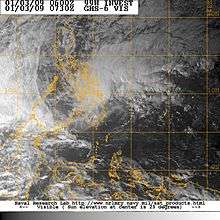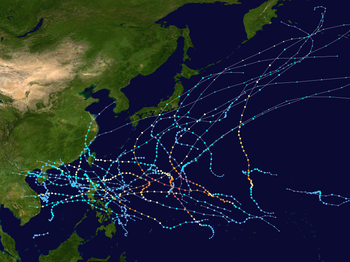Tropical Depression Auring (2009)
Tropical Depression Auring formed as a tropical disturbance late on December 30, 2008, to the southeast of Manila in the Philippines. Over the next few days the disturbance gradually developed before early on January 3, the Philippine Atmospheric, Geophysical and Astronomical Services Administration (PAGASA) and the Japan Meteorological Agency (JMA), reported that the disturbance had intensified into the first tropical depression of the season with PAGASA assigning the name Auring to the depression. As the Depression was moving into a high level of vertical wind shear, it did not develop any further and late on January 5 as the baroclinic zone approached Auring, it was downgraded to an area of low pressure by the PAGASA before the JMA followed suit the next day as it was declared as dissipated by the JTWC.
| Tropical depression (JMA scale) | |
|---|---|
 Tropical Depression Auring on January 4 | |
| Formed | January 3, 2009 |
| Dissipated | January 6, 2009 |
| Highest winds | 10-minute sustained: 55 km/h (35 mph) |
| Lowest pressure | 1000 hPa (mbar); 29.53 inHg |
| Fatalities | 1 direct, 1 indirect, 9 missing |
| Damage | $498,127.8 (2017 USD) |
| Areas affected | Philippines |
| Part of the 2009 Pacific typhoon season | |
Heavy rain from Auring produced severe flooding in the eastern Philippines. Two people were killed and nine others were left missing. A total of 305 homes were destroyed and another 610 were damaged. In addition, an estimated 53 hectares (130.9 acres) of rice and 3.5 hectares (8.6 acres) of corn were damaged. About 43,851 people were affected by the depression and damages were estimated at PHP 23 million ($498,318 USD).
Meteorological history
_2009_track.png)
Late on January 1, 2009, the Joint Typhoon Warning Center (JTWC) reported that an area of deep atmospheric convection had persisted for the last 48 hours about 730 km (455 mi), to the southeast of Manila in the Philippines. Deep convection was developing over the northern quadrant of a weak low level circulation center.[1][2] A subtropical ridge of pressure was helping to guide the disturbance and was providing good outflow as well as low to moderate vertical wind shear.[2] However, as the disturbance was moving into a higher level of vertical wind shear the depression was not expected to develop into a significant tropical cyclone within 48 hours.[2] During the next 48 hours the disturbance gradually developed, with the Japan Meteorological Agency (JMA) and the Philippine Atmospheric, Geophysical and Astronomical Services Administration (PAGASA) reporting early on January 3 that it had become the first tropical depression of the season, with the name Auring being assigned to the depression by PAGASA whilst it was located about 140 km (85 mi) east of Surigao City on the Philippine island of Mindanao.[3][4] This came after the low level circulation center had started to consolidate as deep convection was being fueled by a poleward diffluence despite being in an area of strong vertical wind shear.[5] Over the next couple of days as Auring moved towards the east, dry air started to wrap in to its low level circulation center which started to weaken the depression after it had peaked with winds of 45 km/h, (30 mph) 10-min sustained and a peak pressure of 1006 hPa/Mbar.[6][7] As the baroclinic zone approached the depression late on January 5, PAGASA downgraded the depression to an area of low pressure as the baroclinic zone was approaching the depression, as vertical wind shear had increased and outflow became hindered. However the JMA continued to issue warnings on the depression until early the next morning when the depression was declared dissipated by the JTWC and the JMA.[8][9][10][11]
Preparations and impact

Upon being classified as a tropical depression, the Philippine Atmospheric, Geophysical and Astronomical Services Administration issued Public Storm Warning Signal #1 for Samar, Leyte, the Camotes Islands, Surigao del Norte, Siargao Island, and Dinagat Island as winds up to 60 km/h (37 mph) were expected to affect those areas.[4] Three hours later, Biliran Island was also put under the warning signal.[12] On January 4, all signals, except in Eastern Samar, were lifted as Auring recurved and moved away from the Philippines.[13] The warning signal for Eastern Samar was lifted early the next day.[14]
Heavy rains from Auring triggered flooding across the eastern provinces of the Philippines. A total of 38,764 people were evacuated to avoid floodwaters. The rains caused the Cagayan River to swell, leading to the death of a 12-year-old boy in Gingoog City.[15] In Talisay City, Cebu, a 27-year-old woman was killed after she was electrocuted by a steel wire which was knocked down by high winds produced by Auring.[16] Nine other people, all of whom are children, were listed as missing.[17] About 12,211 people were left stranded at ports due to dangerous conditions caused by the depression. An additional 14 trucks, 44 light cars, 75 passenger buses, 27 vessels and 295 rolling cargoes were also stranded.[18] Severe flooding destroyed 305 homes, 199 of which were in Macasandig. Another 610 homes sustained damage. An estimated 53 hectares (130.9 acres) of rice and 3.5 hectares (8.6 acres) of corn were damaged. About 43,851 people were affected by the storm, mainly along the Cagayan River.[19] The remnants of Auring brought heavy rains to the flooded areas again on January 7, triggering several landslides which blocked off roads and damaging power lines, leaving parts of the Catanduanes without power for several hours.[20] Damages from the depression were estimated at PHP 23 million ($498,318 USD)[21] and an estimated 5,000 families were left homeless.[22]
Aftermath
The severe flooding on Siargao Island led to the issuance of a state of calamity.[21] In addition to the state of calamity in Siargao Island, 16 villages within Cagayan de Oro City were declared calamity areas.[17] In the wake of Auring, the Department of Social Welfare and Development (DSWD) provided family food packets and assistance to flooded areas, valued at PHP 372,760 ($8,120 USD). Relief funds of PHP 292,189.11 ($6,365 USD), stockpiles of food valued at PHP 77,431.2 ($1,686 USD), and non-food items valued at PHP 413,568 ($9,009 USD) were available if needed. Residents who were left homeless in Iligan City were provided with assistance at an estimated cost of PHP 1,129,870 ($24,613 USD).[19]
The Robinson’s Supermarket donated 97 packs of bihon, 77 packets of bihon palabok, 525 packs of misua, and 208 cans of carne norte; Cagayan de Oro Hotel and Restaurant Association donated 12 bags of linen; Nestlé provided 51 boxes of milo; Grains Retailers Confederations of the Philippines sent 30 sacks of rice; National Transmission Corporation provided nine boxes of assorted canned goods; Rotary International District 3870 donated six sacks of rice, one box of used clothing, and 40 loaves of bread; STI Rotary Club of Center Point provided 50 boxes assorted goods and food items; SM City Cagayan donated 180 family food packs; DYNAMIC Pharmacy provided one box of assorted medicine; Xavier Estates Catholic Groups sent assorted clothing and boxes of food; Bombo Radyo Philippines donated three boxes of bottled water and assorted food items, and PNRC provided 36 sacks of rice, 18 boxes of sardines, and 38 boxes of noodles.[19]
See also
References
- Joint Typhoon Warning Center (2008-12-31). "Tropical Depression Auring Best Track (part 1)". United States Naval Research Laboratory. Archived from the original on January 8, 2009. Retrieved 2009-01-08.CS1 maint: unfit url (link)
- "Significant Tropical Weather Advisory for the Western and Southern Pacific 2009-01-01 22z". Joint Typhoon Warning Center. 2009-01-01. Archived from the original on January 2, 2009. Retrieved 2009-11-08.CS1 maint: unfit url (link)
- "JMA WWJP25 Advisory 2009-01-03 00z". Japan Meteorological Agency. 2009-01-03. Archived from the original on January 3, 2009. Retrieved 2009-11-08.CS1 maint: unfit url (link)
- "Tropical Cyclone Alert: Tropical Depression "Auring" January 3, 2009 10z". Philippine Atmospheric, Geophysical and Astronomical Services Administration. January 3, 2009. Archived from the original on January 3, 2009. Retrieved September 15, 2013.
- "Significant Tropical Weather Advisory for the Western and Southern Pacific 2009-01-03 20z". Joint Typhoon Warning Center. 2009-01-03. Archived from the original on January 4, 2009. Retrieved 2009-11-08.CS1 maint: unfit url (link)
- "Significant Tropical Weather Advisory for the Western and Southern Pacific 2009-01-04 06z". Joint Typhoon Warning Center. 2009-01-04. Archived from the original on 2009-11-08. Retrieved 2009-11-08.
- "Storm log: Tropical Depression Auring 2009". Typhoon 2000. 2009-01-03. Archived from the original on November 8, 2009. Retrieved 2009-11-08.CS1 maint: unfit url (link)
- "Significant Tropical Weather Advisory for the Western and Southern Pacific 2009-01-05 22z". Joint Typhoon Warning Center. 2009-01-05. Archived from the original on January 5, 2009. Retrieved 2009-11-08.CS1 maint: unfit url (link)
- "PAGASA Advisory 2009-01-05 22z". Philippine Atmospheric, Geophysical and Astronomical Services Administration. 2009-01-05. Archived from the original on January 5, 2009. Retrieved 2009-11-08.CS1 maint: unfit url (link)
- "JMA Advisory 2009-01-06 00z". Japan Meteorological Agency. Archived from the original on January 6, 2009. Retrieved 2009-01-08.CS1 maint: unfit url (link)
- "Significant Tropical Weather Advisory for the Western and South Pacific Oceans 2009-01-06 06z". Joint Typhoon Warning Center. Archived from the original on January 7, 2009. Retrieved 2009-01-08.CS1 maint: unfit url (link)
- "PAGASA Advisory 2009-01-03 15z". Philippine Atmospheric, Geophysical and Astronomical Services Administration. 2009-01-03. Archived from the original on January 3, 2009. Retrieved 2009-01-08.CS1 maint: unfit url (link)
- "PAGASA Advisory 2009-01-04 09z". Philippine Atmospheric, Geophysical and Astronomical Services Administration. 2009-01-04. Archived from the original on January 4, 2009. Retrieved 2009-01-08.CS1 maint: unfit url (link)
- "PAGASA Advisory 2009-01-05 03z". Philippine Atmospheric, Geophysical and Astronomical Services Administration. 2009-01-05. Archived from the original on January 5, 2009. Retrieved 2009-01-08.CS1 maint: unfit url (link)
- Rene Acosta (2009-01-05). "Thousands of 'Auring' victims still in evacuation centers". Business Mirror. Archived from the original on 2009-01-08. Retrieved 2009-01-08.
- Rene F. Alima (2009-01-06). "Mother electrocuted in Talisay". Cebu Daily News. Archived from the original on August 2, 2009. Retrieved 2009-05-10.
- Cong B. Corrales (2009-01-07). "16 villages declared 'calamity areas'". The Sun Star. Archived from the original on November 8, 2009. Retrieved 2009-05-10. Italic or bold markup not allowed in:
|publisher=(help) - Helen Flores (2009-01-05). "'Auring' threatens eastern Visayas". The Philippine Star. Archived from the original on 2009-11-08. Retrieved 2009-01-05.
- "Consolidated Report on Flash Floods in Cagayan de Oro City and Gingoog City" (PDF). National Disaster Coordinating Council. 2009-01-06. Archived from the original (PDF) on November 8, 2009. Retrieved 2009-01-09.
- "Minor Flooding and Landslides in Catanduanes" (PDF). National Disaster Coordinating Council. 2009-01-07. Archived from the original (PDF) on May 30, 2011. Retrieved 2009-01-09.
- Government of the Philippines (2009-01-09). "PGMA orders immediate rehabilitation of flood-ravaged areas in Regions X, XIII". Reliefweb. Archived from the original on 2009-11-08. Retrieved 2009-01-10.
- Staff Writer (2009-01-04). "PNRC aids 5,000 families left homeless by Auring". GMA News. Archived from the original on November 8, 2009. Retrieved 2009-05-10.CS1 maint: unfit url (link)
External links
| Wikimedia Commons has media related to Tropical Depression Auring (2009). |
